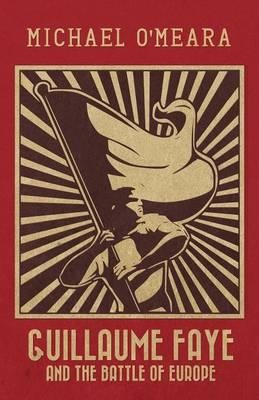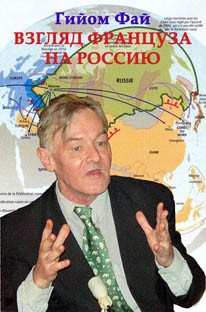lundi, 25 mars 2013
Guillaume Faye & the Battle of Europe
The very first book about Faye's work!
A must for all his friends, who remain tenderly true to him, who has been so many times betrayed, ruined and impoverished by some of his own political "friends"!
Many thanks to the British publisher of Michael O'Meara's study!
Guillaume Faye & the Battle of Europe
By Greg Johnson
Ex: http://www.counter-currents.com/
Michael O’Meara
Guillaume Faye and the Battle of Europe [2]
London: Arktos, 2013
 Guillaume Faye is a prolific and brilliant French social and political philosopher and polemicist who is one of the leading lights of the French New Right. Faye’s reputation as a visionary and iconoclast created a global interest in his writings long before they became available in translation. Thus, for the past decade, Michael O’Meara has earned the gratitude of many by serving as the principal interpreter of Faye’s writings for the English-speaking world and far beyond, now that English is the global lingua franca.
Guillaume Faye is a prolific and brilliant French social and political philosopher and polemicist who is one of the leading lights of the French New Right. Faye’s reputation as a visionary and iconoclast created a global interest in his writings long before they became available in translation. Thus, for the past decade, Michael O’Meara has earned the gratitude of many by serving as the principal interpreter of Faye’s writings for the English-speaking world and far beyond, now that English is the global lingua franca.
O’Meara’s new book Guillaume Faye and the Battle of Europe collects ten essays, reviews, and introductions dealing with Faye’s principal books. The volume also includes three short translations and a newly-written Introduction: “Why Read Guillaume Faye,” which succinctly explains the strengths and weaknesses of Faye’s writings. This slender anthology of 130 pages is an ideal introduction to Faye’s work, and it can easily be read in an afternoon.
Faye, like New Rightists and White Nationalists in European societies around the globe, is motivated by a sense of danger: the reigning system — liberal, democratic, capitalist, egalitarian, globalist — has set the white race in all of its homelands on the path to extinction through declining birthrates and race replacement through immigration and miscegenation. If we are to survive, we must understand this system, critique it, and frame an alternative that will secure the survival and flourishing of our race. Then we need to figure out how we can actually implement these ideas.
I like Faye’s approach for a number of reasons.
First, he thinks big. He wants to take all of Europe back for Europeans. Furthermore, to secure the existence of Europe against the other races and power blocs, he envisions the creation of a vast “Eurosiberian” Imperium, stretching from Iceland to the Pacific, with a federated system of government and an autarkic economy. Only such an imperium will be equal to the challenges posed by the other races in a world or burgeoning populations and shrinking resources.
Second, he thinks racially. His answer to the question “Who are we?” is ultimately racial, not cultural, religious, or subracial: white people are a vast, extended family descending from the original inhabitants of Europe after the last Ice Age. There are, of course, cultural and subracial identities that are also worth preserving within a federated imperium, but not at the expense of the greater racial whole.
Third, he is not an a luddite, primitivist, or Hobbit. He values our heritage, but he is attracted less to external social and cultural forms than to the vital drives that created them and express themselves in them. He also wishes to do justice to European man’s Faustian drive toward exploration, adventure, science, and technology. His “archeofuturism” seeks to fuse vital, archaic, biologically-based values with modern science and technology.
 Fourth, Faye turns the idea of collapse into something more than a deus ex machina, a kind of Rapture for racists. We know a priori that an unsustainable system cannot be sustained forever and that some sort of collapse is inevitable. But Faye provides a detailed and systematic and crushingly convincing analysis of how the present system may well expire from a convergence of catastrophes. Of course, we need to be ready when the collapse comes. We need a clear metapolitical framework and an organized, racially conscious community to step into the breach, or when the present system collapses, it will simply be replaced with a rebranded form of the same ethnocical regime.
Fourth, Faye turns the idea of collapse into something more than a deus ex machina, a kind of Rapture for racists. We know a priori that an unsustainable system cannot be sustained forever and that some sort of collapse is inevitable. But Faye provides a detailed and systematic and crushingly convincing analysis of how the present system may well expire from a convergence of catastrophes. Of course, we need to be ready when the collapse comes. We need a clear metapolitical framework and an organized, racially conscious community to step into the breach, or when the present system collapses, it will simply be replaced with a rebranded form of the same ethnocical regime.
Fifth, Faye is a strong critic of Christianity as the primary fount of the moral universalism, egalitarianism, and individualism that are at the root of our decline.
O’Meara’s principal criticisms of Faye are fourfold.
First, O’Meara thinks that Faye is a bit too Faustian and futurist, specifically his interest in transhumanism, genetic engineering, and eugenics, which no longer take man’s nature as a fixed reality and standard, strikes O’Meara as nihilistic. (This is the argument of C. S. Lewis’s The Abolition of Man, for instance.) O’Meara also thinks Faye is too empiricistic in his approach to knowledge and too ready to dismiss traditional notions of the sacred. These are, of course, rather broad objections, too broad to be really satisfying, and I wish O’Meara would put his specific metaphysical and moral cards on the table. Is he a Christian, a dualist, a Traditionalist, a Platonist, or something else?
Second, O’Meara thinks that Faye focuses too narrowly on Islam as the enemy of Europe, thus downplaying the roles of globalist, liberal, American, and Jewish forces in opening Europe to Islamic colonization.
Third, because Faye thinks that Islam is the principal enemy, he has embraced Israel and global Jewry as an ally, which has had a devastating effect on his credibility in nationalist circles. He has also become softer on America, which is the citadel of globalism, capitalism, liberalism, and Jewish power.
Fourth, O’Meara is critical of Faye’s critique of Christianity, going so far as to claim that Christianity “created and civilized Europe” (as if Greece and Rome were not civilized) and “conserved much of the Greco-Roman tradition” (i.e., what it did not see fit to destroy outright or allow to perish through neglect).
I was recently rooting for a black pope so I would never again have to suffer Catholic apologists quoting Belloc’s preposterous claim that “Europe is the faith and the faith is Europe.” Christianity is a universalistic religion, not an ethnic religion. It was never confined solely to Europe. Most of its followers today are non-whites, and it is growing primarily in non-white countries.
Furthermore, European man existed before Christianity, and if we continue to exist after Christianity, it will be no thanks to Christianity itself, which is overwhelmingly and actively hostile to our race’s survival. Christianity is in desperate need of a racial Reformation.
So when racially-conscious Christians seek to muddle anti-Christian discourse on the Right by waxing nostalgic about that olde tyme religion, or to suppress it by dark predictions that we can’t afford to offend Christians, my response is twofold: (1) The existing churches, which are objectively anti-white, will not cease being anti-white unless they feel that their survival is threatened by sustained criticism from people like Faye and plenty more like him. Thus anti-Christian New Rightists are de facto allies of Christian New Rightists, provided that they really want to reform their churches. (2) Racially conscious Christians need to focus their energy on combating anti-white attitudes in their churches rather than anti-Christian attitudes among whites.
Pagans and neo-pagans do not lack a sense of the sacred. Nor do they lack an appreciation of Christianity’s contributions to white culture. One does not need to be a Christian to treasure Bach’s Saint Matthew Passion any more than one has to believe in Zeus to treasure Aeschylus and Sophocles. They are supreme expressions of our race’s genius, regardless of their associations with dead or dying religions. And Faye himself has said that he will fight the transformation of Europe’s cathedrals into mosques — even as the bishops are trying to hand over the keys. And aside from a few church-burning teenage hooligans, I think that most neo-pagans would do the same.
These quibbles aside, I highly recommend Guillaume Faye and the Battle of Europe. Long after Arktos has published translations of all of Faye’s books, prospective readers will be turning to O’Meara for an preliminary overview and orientation before plunging in. Every library should have this book.
Article printed from Counter-Currents Publishing: http://www.counter-currents.com
URL to article: http://www.counter-currents.com/2013/03/guillaume-faye-and-the-battle-of-europe/
URLs in this post:
[1] Image: http://www.counter-currents.com/wp-content/uploads/2013/03/fayebattle.jpg
[2] Guillaume Faye and the Battle of Europe: http://www.amazon.com/gp/product/1907166882/ref=as_li_ss_tl?ie=UTF8&camp=1789&creative=390957&creativeASIN=1907166882&linkCode=as2&tag=countercurren-20
18:09 Publié dans Livre, Nouvelle Droite | Lien permanent | Commentaires (0) | Tags : livre, guillaume faye, nouvelle droite, france, michael o'meara |  |
|  del.icio.us |
del.icio.us |  |
|  Digg |
Digg | ![]() Facebook
Facebook



Les commentaires sont fermés.